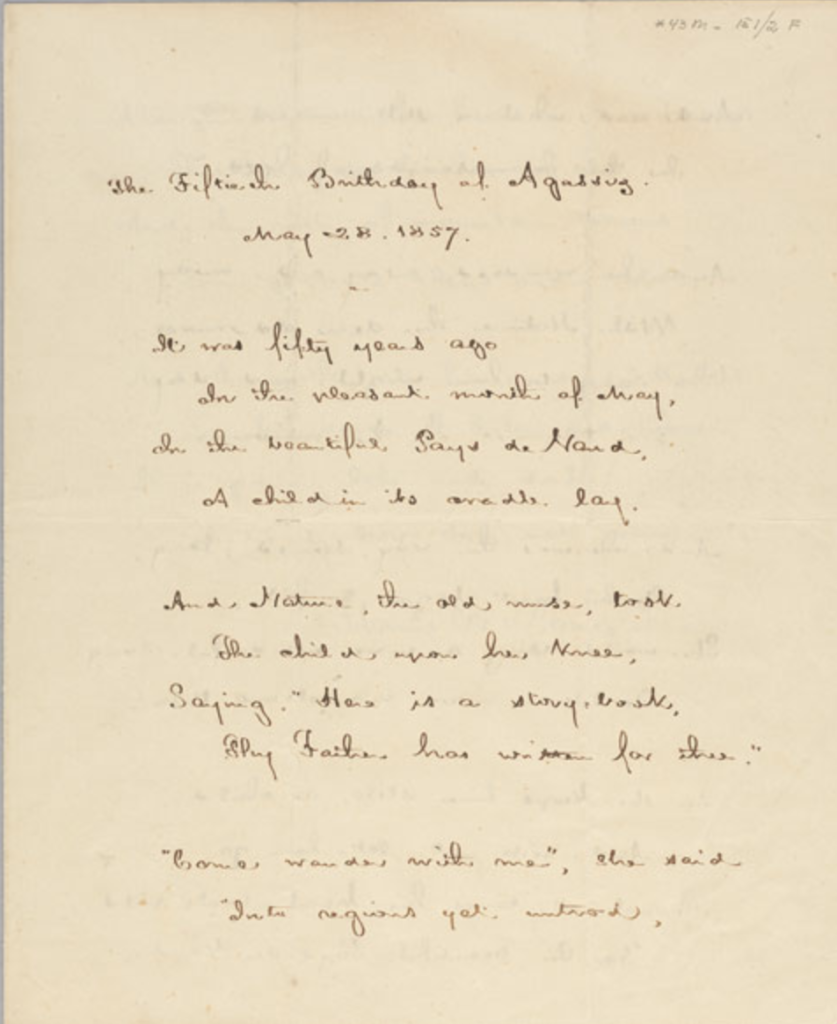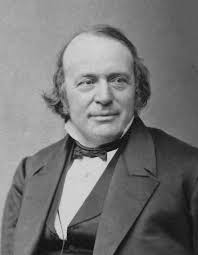The Fiftieth Birthday of Agassiz [1]
By Henry Wadsworth Longfellow
Annotations by Catherine Bowlin

It was fifty years ago
In the pleasant month of May,
In the beautiful Pays de Vaud, [2]
A child in its cradle lay.
And Nature, the old nurse, took
The child upon her knee,
Saying: “Here is a story-book
Thy Father has written for thee.”
“Come, wander with me,” she said,
“Into regions yet untrod;
And read what is still unread
In the manuscripts of God.”
And he wandered away and away
With Nature, the dear old nurse,
Who sang to him night and day
The rhymes of the universe.
And whenever the way seemed long,
Or his heart began to fail,
She would sing a more wonderful song,
Or tell a more marvellous tale.
So she keeps him still a child,
And will not let him go,
Though at times his heart beats wild
For the beautiful Pays de Vaud;
Though at times he hears in his dreams
The Ranz des Vaches of old, [3]
And the rush of mountain streams
From glaciers clear and cold;
And the mother at home says, “Hark!
For his voice I listen and yearn;
It is growing late and dark,
And my boy does not return!”
May 28, 1857

Longfellow, Henry Wadsworth. “The Fiftieth Birthday of AGassiz.” The Courtship of Miles Standish and Other Poems. (1858): 196-8. https://www.hwlongfellow.org/poems_poem.php?pid=141
Contexts
Louis Agassiz was a well-known professor of zoology and geology at Harvard who promoted the biologically racist ideal polygenesis, “the notion that different species had different origins; he endorsed the idea of racially differential human origins” (Kilcup 159; see full citation below). Agassiz argued against many of Darwin’s ideas as the former believed in creationism and intelligent design. Regardless of Agassiz’s racist beliefs, many Americans celebrated his work.
Racial science, also called scientific racism and biological racism, was the belief that scientific data exists that justifies racism. Though no longer considered scientific, this type of science (such as polygenesis, eugenics, racialism, and race realism) was supported throughout most of the scientific community.
Resources for Further Study
- Kilcup, Karen. Stronger, Truer, Bolder: American Children’s Writing, Nature, and the Environment. University of Georgia Press, 2021.
- Skibba, Ramin. “The Disturbing Resilience of Scientific Racism.” Smithsonian Magazine. 2019. (Link)
- Wood, Naomi. “(Em)bracing Icy Mothers: Ideology, Identity, and Environment in Children’s Fantasy.” Wild Things: Children’s Culture and Ecocriticism. Ed. Sidney I. Dobrin and Kenneth B. Kidd. Wayne State University Press, 2004. (Google Book)
Pedagogy
According to Naomi Wood, “Longfellow’s poem illustrates the romantic tradition inspired by Rousseau and Wordsworth, a tradition in which Nature is depicted as the child’s mother or nurse, an influence that works for the good and well-being of the child” (198, citation above). This representation of nature is idealistic and potentially damaging; Nature is personified, and she invites the child to discover parts of her while also taking care of the child. This highlights Nature’s power in the poem to keep the boy a child forever. Therefore, the young child is stuck, perpetually discovering Nature forever.
This interpretation of Nature may encourage discussion about the many different representations of Nature and how those representations evolve across literary periods.
[1] Jean Louis Rodolphe Agassiz (1806-1873): a Swiss-born American biologist and geologist recognized as an influential scholar of Earth’s natural history
[2] Mountainous district in Switzerland
[3] A melody traditionally played on the horn by the Swiss Alpine herdsmen as they drove their cattle to or from the pasture